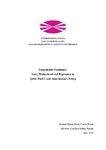Unspeakable Femininity: Love, Motherhood and Depression in Sylvia Plath’s and Anne Sexton’s Poetry
Title
Unspeakable Femininity: Love, Motherhood and Depression in Sylvia Plath’s and Anne Sexton’s PoetryAuthor(s)
Directors
Núñez Puente, CarolinaDate
2018Center/Dept./Entity
Universidade da Coruña. Facultade de FiloloxíaDescription
Traballo fin de grao (UDC.FIL). Inglés: estudios lingüísticos y literarios. Curso 2017/2018Abstract
[Abstract] This undergraduate project analyzes a selection of poems written by two United States authors: Sylvia Plath —“Love Letter” (1960), “Morning Song” (1961) and “Lady Lazarus” (1962) —and Anne Sexton— “For My Lover, Returning to His Wife” (1969), “Unknown Girl in the Maternity Ward” (1960) and “Imitations of Drowning” (1962). While providing a close reading of the poems, this study compares Plath’s and Sexton’s treatment of love, motherhood and depression, and discusses the importance of form when developing the mental state of the poetic persona. To pursue these objectives, I base my analyses on Middlebrook’s extensive research on Sexton, Bloom’s collection of essays on Plath, and a few selected approaches to feminism in Humm’s Dictionary of Feminist Theory, among other secondary sources. To conclude, I reflect upon Plath’s and Sexton’s poetry as a valuable tool for the liberation of
women, highlighting both authors’ ability to defy patriarchal constraints by overcoming previous taboos and poeticizing female experience in all its forms.
Keywords
American poetry
Women poetry
Self destruction
Genre
Plath, Sylvia
Sexton, Anne
Women poetry
Self destruction
Genre
Plath, Sylvia
Sexton, Anne
Rights
Os titulares dos dereitos de propiedade intelectual autorizan a visualización do contido deste traballo a través de Internet, así como a súa reproducción, gravación en soporte informático ou impresión para o seu uso privado e/ou con fins de estudo e de investigación. En nengún caso se permite o uso lucrativo deste documento. Estos dereitos afectan tanto ó resumo do traballo como o seu contido Los titulares de los derechos de propiedad intelectual autorizan la visualización del contenido de este trabajo a través de Internet, así como su repoducción, grabación en soporte informático o impresión para su uso privado o con fines de investigación. En ningún caso se permite el uso lucrativo de este documento. Estos derechos afectan tanto al resumen del trabajo como a su contenido






